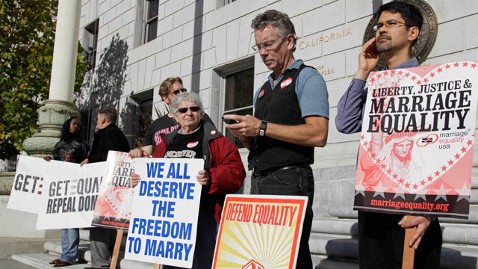What Is Proposition 8? Gay Rights Opponents Win California High Court Victory

Eric Risberg/AP Photo
California’s Supreme Court today gave opponents of gay marriage a victory by ruling that they have the legal right to defend Proposition 8, a voter initiative that defines a marriage as between a man and a woman.
Since the controversial measure passed two years ago, it has garnered national attention for becoming the first measure of its kind to add to the state constitution a definition of marriage and bar gay marriage, which has been approved by several states.
Proposition 8 overturned a ruling by the California Supreme Court that allowed gay and lesbian couples to marry. While it didn’t nullify marriages that took place prior to Nov. 5, 2008, it banned homosexual couples from seeking marriages.
But Proposition 8 has been stuck in a legal limbo since it passed in November 2008 by a 52 percent vote. Last year, a federal district court judge declared that the measure amounts to unconstitutional discrimination and ordered that it be immediately struck down.
“Proposition 8 fails to advance any rational basis in singling out gay men and lesbians for denial of a marriage license,” wrote U.S. District Court Judge Vaughn Walker in a 136-page decision. “Indeed, the evidence shows Proposition 8 does nothing more than enshrine in the California constitution the notion that opposite-sex couples are superior to same-sex couples.”
The controversial ballot measure - which has invoked some violent protests – is poised to head to the U.S. Supreme Court as it bobs back and forth in courts.
Despite its passage, California politicians have been hesitant to support the proposition. Former Gov. Arnold Schwarzenegger and most state leaders opposed the ban when it was first proposed. Gov. Jerry Brown also refused to defend it in the court.
Supporters of the proposition – backed by a broad coalition of conservative religious groups – have argued that the ban is not discriminatory but simply codifies a historic understanding of what constitutes marriage.
Lawyers supporting the ballot measure argued in federal court that voters endorsed a “fundamental, definitional feature” of marriage that has historical roots “in this country and, almost without exception, in every civilized society that has ever existed.”
Though their appeals were struck down by the federal district judge, the Supreme Court found that supporters do have the right to move forward.
“In a post-election challenge to a voter-approved initiative measure, the official proponents of the initiative are authorized under California law to appear and assert the state’s interest in the initiative’s validity and to appeal a judgment invalidating the measure when the public officials who ordinarily defend the measure or appeal such a judgment decline to do so,” stated a ruling by Judge Cantil-Sakauye.
Lawyers for gay rights groups have described legalizing same-sex marriage as the next chapter in the civil rights movement. They say it is akin to ending laws that stopped whites and blacks from marrying.
Experts say that if Proposition 8 reaches the U.S. Supreme Court, the decision could transform social and legal precedent. They compare the potential impact to the famous 1954 Brown v. Board of Education decision, which desegregated schools, and the 1967 Loving v. Virginia decision, which ended laws banning interracial marriage.
Forty states have laws banning same-sex marriage. Five states — Massachusetts, Iowa, Connecticut, Vermont and New Hampshire — and the District of Columbia currently allow and perform same-sex marriages. Four states recognize marriages performed elsewhere, and nine states grant civil unions or partnerships.
ABC News’ Russell Goldman contributed to this report.